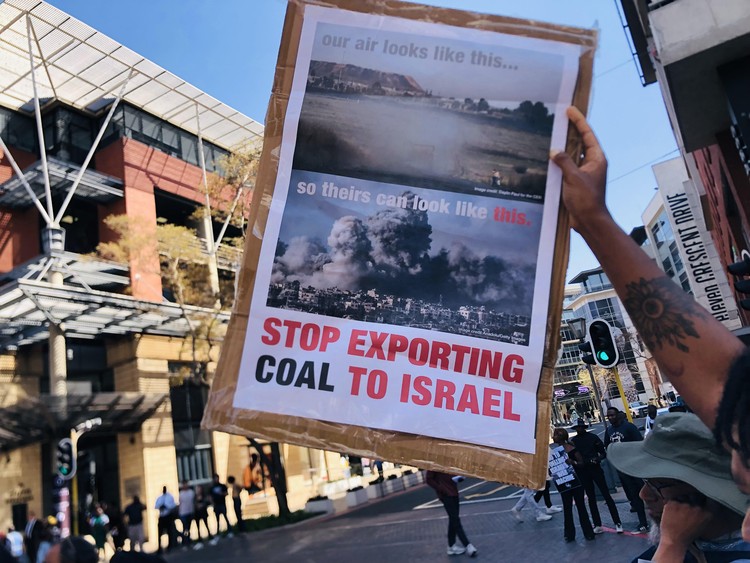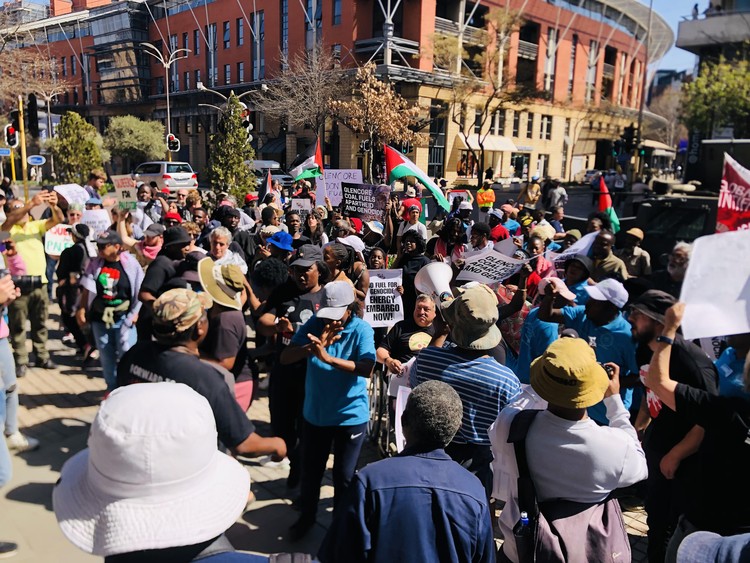Glencore urged to stop selling coal to Israel
Unions and civic organisations gather at mining company’s head office
Protestors in Johannesburg called on Glencore to stop exporting coal to Israel. Photos: Silver Sibiya
- Unions and civic organisations protested at Glencore head offices on Thursday, calling on the mining company to stop supplying coal to Israel.
- This follows the decision by Colombia to suspend coal sales to Israel.
- The protesters said Glencore executives could be held complicit in death and destruction in Palestine.
- A Glencore executive declined to respond.
Almost 200 representatives of mining unions and civic organisations protested at the offices of coal mining company Glencore in Johannesburg on Thursday, calling for the company to stop supplying coal to Israel.
Members of the National Union of Mineworkers, the General Industries Workers Union of South Africa, the Palestine Solidarity Alliance, BDS, Social Youth Movement, and other organisations handed over a memorandum at Glencore’s head office in Melrose Arch.
This follows Colombia’s President Gustavo Petro’s decision to stop exports of coal to Israel in a bid to put pressure on Tel Aviv to end the war in Gaza. According to the protestors, Colombia was the biggest supplier of coal to Israel while South Africa-based Glencore is the third largest supplier (GroundUp has not verified this claim). The protesters said by supplying coal to Israel the mining company was fueling the war in Palestine.
South African BDS Coalition coordinator Roshan Dadoo said the supply of coal to Israel had contributed to death and destruction in Gaza. “About 40,000 Palestinians are said to have been killed and everyday we are hearing about 100 to 200 more.”
She said if Israel had no coal it would not be able to continue with the war.
“Israel has to import oil, gas, and coal. Twenty-two percent of its energy comes from coal. Glencore is the biggest mining coal mining company here sending coal to Israel. So we’re calling today on our government to end coal sales to Israel because really that will help. As we had an oil embargo against apartheid South Africa that made it harder for the regime to continue, we must put the same pressure on apartheid Israel,” she said.
Referring to the recent International Court of Justice (ICJ) rulings on Israel, she said that if Glencore’s executives did not “pay attention”, they would be held complicit. “They will be held as having contributed to the genocide.”
“We want to see South Africa stick to what it did in the ICJ when it brought the case and see this through,” she said.
Rina King from South African Jews for a Free Palestine said this was a way of putting pressure on Israel.
“It’s very important that we implement sanctions and boycotts against Israel, because America is not doing anything, and this genocide is going to continue. Israel is going to continue to oppress Palestinians until they feel the pinch.”
King called for other big players such as Russia to also follow Colombia’s action to stop trading coal with Israel.
Glencore Senior Legal Adviser Nico Geldenhuys accepted the memorandum but declined to speak to the media or to address the crowd.
At the Glencore AGM in Switzerland in May, a questioner asked what Glencore was doing to review a relationship with Israel which “could lead to people thinking that Glencore is aiding and abetting a potential genocide and that this could lead to criminal liability?”
According to a report of the meeting, Chairman Kalidas Madhavpeddi expressed “great sympathy for the situation”. But, he said,“What you’re saying has no merit at all.”
Scores of people participated in Thursday’s protest.
Support independent journalism
Donate using Payfast

Don't miss out on the latest news
We respect your privacy, and promise we won't spam you.
Next: In these Free State villages you must share water with the pigs
Previous: Future of the nearly 900 people living in Woodstock Hospital hangs in the balance
© 2024 GroundUp. This article is licensed under a Creative Commons Attribution-NoDerivatives 4.0 International License.
You may republish this article, so long as you credit the authors and GroundUp, and do not change the text. Please include a link back to the original article.
We put an invisible pixel in the article so that we can count traffic to republishers. All analytics tools are solely on our servers. We do not give our logs to any third party. Logs are deleted after two weeks. We do not use any IP address identifying information except to count regional traffic. We are solely interested in counting hits, not tracking users. If you republish, please do not delete the invisible pixel.


